By Avigayil Kadesh
Kibbutz Sde Eliyahu’s secret weapon against date infestation is ... donkeys. Rodent control? That’s handled by owls. Simple netting protects ripening figs from birds and insects.
Israel is world-renowned for its unprecedented accomplishments in agricultural technology. Israeli researchers perfected drip irrigation and drought-resistant seed treatments, produced superior vegetables with brackish water, and developed many other revolutionary products and techniques it shares worldwide.
And yet, in the early 1970s, wind drift from chemical pesticides and fertilizers was getting into houses in Kibbutz Sde Eliyahu and making people sick. Farmer Mario Levy began wondering how this part of Israel – the hot, spring-fed Beit She’an Valley hugging the northern border with Jordan – served as the breadbasket of ancient Israel long before the advent of these substances.
So Levy went off to Switzerland to learn the ABCs of organic farming, and brought the knowhow back to Sde Eliyahu. Now 90, Levy is the acknowledged father of organic agriculture in Israel, and still teaches others how to do it.
In the early 1980s, the kibbutz founded BioBee Biological Systems, which breeds natural enemies of destructive agricultural pests -- spiders for strawberry mites, Orius pirate bugs for thrips and aphids, sterile Mediterranean fruit flies to protect orchards, and much more -- and sells them worldwide.
Take the Bio-Tour
Now celebrating its 74th anniversary, Sde Eliyahu offers a two-hour Bio-Tour to show visitors from many different countries how back-to-nature principles work hand-in-hand with modern advances to bring out the best of more than 2,000 acres of farmland.
Although this is just one of many kibbutzim (cooperative farms) in Israel, guide Beni Gavrieli says that thanks to Levy and his protégés, the 180-family Sde Eliyahu has led the way in natural agriculture in Israel. It boasts one of the largest organic farms in the country.
“All the fields that touch the living areas of the kibbutz are certified organic,” says Gavrieli, who has raised his family here for the past 35 years.
The non-organic crops are tended with very few chemical compounds. “We grew cotton for a number of years,” he says. “Usually you have to spray it on a regular basis, and we proved you could grow it successfully without all that spraying. The whole way that cotton is grown in Israel changed as a result of our findings.”
Bio-Bee has also made a difference, and not just in Israel.
Gavrieli opens a shipping box to reveal the busy enclosed hive contained inside. This is one of Bio-Bee’s best-selling products.
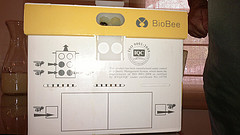
Boxes of pollinating bumblebees are shipped from Sde Eliyahu to farms all over the world.
“In a greenhouse, a closed environment, you don’t have the insects going around so pollination has to be done by hand,” he explains. “We looked around to find the most effective pollinators, and found the bumblebees. When they flap their wings, they shake the whole flower and get the pollen inside. We’ve seen that greenhouses that work with the bees have at least 30 percent more yield, and that means 30% more income for the farmer.”
Bumblebees are gentle creatures, he adds. “They’re not aggressive like honeybees. They’d rather work than sting you.”
Collaborating with Mother Nature
Even before Mario Levy came on the scene, the residents of Kibbutz Sde Eliyahu were looking for natural ways to make their venture thrive.
One solution was to plant a grove of Bengali banyan trees in the center of the kibbutz. “There were no air conditioners then, and the Beit She’an Valley has three temperatures year round: hot, very hot, and hell is a few degrees cooler,” Gavrieli jokes. “They planted these trees to provide a place to cool down.”
Walking around during Bio-Tour, you can feel the temperature difference when standing under the shade of these now mature trees.
Another tactic was to install underground pipes in order to collect and channel the water from a spring running under the kibbutz. The water seeped in through holes in the pipes, and was pumped up to a tower to provide drinking water.
“Our average total amount of annual rain is about 280 millimeters, or 11 to 13 inches,” says Gavrieli. “That’s not much. However, the Beit She’an Valley, also known as the Valley of Springs, is blessed with 35 underground springs, and one of them is right here.”
The spring gradually became more saline over years of drought, and was no longer suitable for drinking. So the kibbutz uses it instead to raise fish commercially in open ponds, concrete ponds and greenhouses.
Some approaches are decidedly low-tech. Gavrieli points out a fig tree covered with netting to shield the ripening fruit from predators. “This is something really simple and effective to protect it from the Mediterranean fruit fly and from birds,” he says. “It’s not fighting nature aggressively.”
Chowing down on compost
How do you nurture field crops successfully without synthetic fertilizers? It turns out that good old-fashioned organic compost does the job even better.
“Plants have to eat throughout the day,” says Gavrieli, as our tour pulls up to Sde Eliyahu’s composting site. “A chemical fertilizer is like a caffeine fix: You give the chemical to the plant, it utilizes what it’s given and then the fertilizer seeps into the soil out of reach of the roots.
“Compost works differently. It improves the quality of the soil by aerating it and allowing the entrance of all kinds of microorganisms that help with nitrogen fixation, making the soil more porous so there’s less runoff, among other advantages. Compost, because it breaks down very slowly, stays in the soil and the plant now has a source of nutrients throughout the whole day, from breakfast to a midnight snack.”
The recipe for organic compost includes cow and chicken manure, broken tree branches and mulch, tumbled together and dampened for about four months in a temperature-controlled environment. Added to this mixture is sludge washed out from trucks that transport animals to local slaughterhouses. The microorganisms in all these materials break them down into rich compost for Sde Eliyahu and other farms.
Several years ago, a worker noticed many kites – medium-sized birds of prey – in the compost. Apparently they were attracted to the meat meal in the mixture. This gave the farmers a great idea for saving their tomato plants from being pecked by chickadees.
Knowing the little chickadees would steer clear of kites, the farmers spread meat meal from the compost site next to the tomato plants. “The kites ‘tweeted’ their friends and relatives about the free food, and pretty soon hundreds came,” says Gavrieli. “The sky was black with them. The chickadees were scared away by the kites. And that’s how we saved the tomatoes.”
Kestrel nesting boxes dot the Sde Eliyahu landscape, encouraging these daytime avian predators to stay on the job.
Owls and donkeys to the rescue
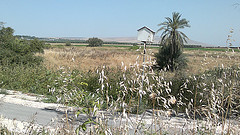 One of 120 owl nesting boxes at Sde Eliyahu
One of 120 owl nesting boxes at Sde Eliyahu
Rodents always pose a problem for farmers. Until about 30 years ago, Sde Eliyahu used the usual remedy: poison. But this caused a whole new problem. Owls would come at night and eat the toxic mice and jackals would eat the poisoned owls. An ugly chain of death was developing.
In 1983, amateur ornithologist Shaul Aviel suggested that if Sde Eliyahu could entice enough owls to take up residence, there would no longer be a need for poison. Today, 120 owl families – parents and five or six chicks at a time – live in nesting boxes placed throughout the growing fields. Each family devours about 5,000 rodents every year.
At first, the owls were still eating poisoned mice they found in neighboring fields in Israel and Jordan. Years of educational efforts have put a stop to that, as farms on both sides of the border began adopting Sde Eliyahu’s method.
“With organic agriculture, you have to educate people to explain why it’s beneficial, and now in the Beit She’an Valley you see a lot of owl houses since everyone has stopped using poison,” says Gavrieli. All the chicks are weighed and banded, helping the farms keep track of the owls throughout their lives.
Just as owls take care of field crops, donkeys care for date palms.
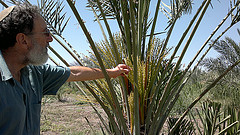 Sde Eliyahu grows nine varieties of organic dates.
Sde Eliyahu grows nine varieties of organic dates.
Donkeys were introduced to Sde Eliyahu’s date plantation about 15 years ago, to accomplish several critical tasks: They eat the weeds, fertilize the trees with their dung, and eat rotten fruit that has fallen to the ground after pest infestation. The digestion process kills the insect eggs so they cannot hatch and infect more fruit.
There is still plenty of human work that goes into tending the nine varieties of dates: Pollen pods on the male trees must be cut off and opened, and the pollen dried and applied by hand to the female trees’ flowers, because wind pollination is not efficient enough for a commercial operation.
“It’s difficult manual labor working in a date plantation,” says Gavrieli. “The only mechanism we have is a cherry-picker to climb to the top of the trees.”
While the dates are developing, workers put net bags over each bunch so insects can’t get in. Then, it takes two strong hands and a machete to harvest every 50-pound cluster.
Still, without the donkeys acting as the sanitary engineers for the date plantation, the work would be even more intense and less fruitful.
“Organic agriculture is looking at what nature provides for us and how to work together instead of working against nature,” says Gavrieli.
“The owls are there; let’s give them free housing. The kites are there; let’s give them free food to keep the chickadees away. The donkeys are there; let’s provide for them and they’ll eat the infected dates.”
Pop some wheat, buy a t-shirt
The Bio-Tour begins and ends at Café BeSadeh (Café in the Field).
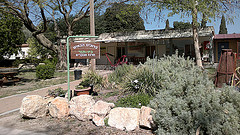
Inside, you can order organic coffee and light dairy meals made on the premises using local produce. You can also buy products grown locally, such as organic grape and pomegranate juice, dates, dried herbs and spices.
To make the tour even more hands-on, guides engage visitors in activities suitable to the season.
If they come when the olives are ripe, they might help press olive oil. Inside the café, tourists may learn the best way to extract seeds from a pomegranate, or pan-toast the wheat they picked earlier in fields “guarded” by ladybugs.
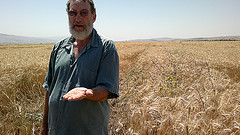 Guide Beni Gavrieli with organic wheat kernels
Guide Beni Gavrieli with organic wheat kernels
The toasted wheat kernels taste just like popcorn, but a whole lot fresher than the stuff you put in your microwave.